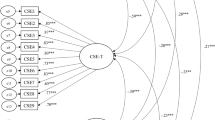Abstract
In this study, we examined the effect of trauma exposure on substance use behaviors, specifically tobaccoand alcohol use, in a group of 84 individuals who sought supportive services after the 1995 Oklahoma City bombing. A self-report instrument was used to assess demographics, sensory exposure, injury,interpersonal exposure through relationship with victims, peritraumatic reaction, grief, posttraumaticstress, worry about safety, functional impairment, and changes in smoking and drinking. Those who reported increased smoking had higher scores on peritraumatic reaction, grief, posttraumatic stress, worry about safety, and trouble functioning. Those who reported increased alcohol intake had higherscores on injury, peritraumatic reaction, grief, posttraumatic stress, worry about safety, and troublefunctioning. Sensory exposure and interpersonal exposure were not significantly different between thosewith and without increased smoking or drinking. Although no causal relationship can be assumed, ourfindings indicate an association of grief and posttraumatic stress with increased substance usebehaviors in disaster victims.
Similar content being viewed by others
REFERENCES
Jacobsen LK, Southwick SM, Kosten TR: Substance use disorders in patients with posttraumatic stress disorder: A review of the literature. Am J Psychiatry 2001; 158:1184–1190
Breslau N, Davis GC, Andreski P, Peterson E: Traumatic events and posttraumatic stress disorder in an urban population of young adults. Arch Gen Psychiatry 1991; 48:216–222
Davidson JRT, Hughes D, Blazer DG, George LK: Posttraumatic stress disorder in the community: An epidemiological study. Psychol Med 1991; 21:713–721
Helzer JE, Robins LN, McEvoy L: Post-traumatic stress disorder in the general population: Findings of the epidemiologic catchment area survey. N Engl J Med 1987; 317:1630–1634
Kessler RC, Sonnega A, Bromet E, Hughes M, Nelson CB: Posttraumatic stress disorder in the national comorbidity survey. Arch Gen Psychiatry 1995; 52:1048–1060
Shalev A, Bleich A, Ursano RJ: Posttraumatic stress disorder: Somatic comorbidity and effort tolerance. Psychosomatics 1990; 31:197–203
Joseph S, Yule W, Williams R, Hodgkinson P: Increased substance use in survivors of the Herald of Free Enterprise disaster. Br J Med Psychol 1993; 66:185–191
Smith EM, North CS, McCool RE, Shea JM: Acute postdisaster psychiatric disorders: Identification of persons at risk. Am J Psychiatry 1990; 147:202–206
Adams PR, Adams GR: Mount Saint Helens's ashfall: Evidence for a disaster stress reaction. Am Psychol 1984; 39:252–260
Solomon SD, Smith EM, Robins LN, Fischbach RL: Social involvement as a mediator of disaster-induced stress. J Appl Soc Psychol 1987; 17:1092–1112
Deering CG, Glover SG, Ready D, Eddleman HC, Alarcon RD: Unique patterns of comorbidity in posttraumatic stress disorder from different sources of trauma. Compr Psychiatry 1996; 37:336–346
Green BL, Lindy JD, Grace MC, Leonard AC: Chronic posttraumatic stress disorder and diagnostic comorbidity in a disaster sample. J Nerv Ment Dis 1992; 180:760–766
Smith DW, Christiansen EH, Vincent R, Hann NE: Population effects of the bombing of Oklahoma City. J Okla State Med Assoc 1999; 92:193–198
Call JA, Pfefferbaum B: Lessons from the first two years of Project Heartland, Oklahoma's mental health response to the 1995 bombing. Psychiatr Serv 1999; 50:953–955
Pfefferbaum B, Flynn BW, Brandt EN, Jr, Lensgraf SJ: Organizing the mental health response to human-caused community disasters with reference to the Oklahoma City bombing. Psychiatr Annals 1999; 29:109–113
Freedy JR, Kilpatrick DG, Resnick HS: Natural disaster and mental health: Theory, assessment, and intervention. J Soc Behav Pers 1993; 8(special issue):49–103
Faschingbauer TR, Devaul RA, Zisook S: Development of the Texas Inventory of Grief. Am J Psychiatry 1977; 134:696–698
Zisook S, DeVaul RA, Click MA, Jr: Measuring symptoms of grief and bereavement. Am J Psychiatry 1982; 139:1590–1593
Weiss DS, Marmar CR: The Impact of Event Scale-Revised. In: Wilson JP, Keane TM, eds. Assessing Psychological Trauma and PTSD. New York: Guilford Press; 1997:399–411
Horowitz M, Wilner N, Alvarez W: Impact of Event Scale: A measure of subjective distress. Psychosom Med 1979; 41:209–218
Zilberg NJ, Weiss DS, Horowitz MJ: Impact of Event Scale: A cross-validation study and some empirical evidence supporting a conceptual model of stress response syndromes. J Consult Clin Psychol 1982; 50:407–414
Tucker P, Dickson W, Pfefferbaum B, McDonald NB, Allen G: Traumatic reactions as predictors of posttraumatic stress six months after the Oklahoma City bombing. Psychiatr Serv1997; 48:1191–1194
Tucker P, Pfefferbaum B, Nixon SJ, Dickson W: Predictors of post-traumatic stress symptoms in Oklahoma City: Exposure, social support, peri-traumatic responses. J Behav Health Serv Res 2000; 27:406–416
American Psychiatric Association: Diagnostic and Statistical Manual-IV, 4th edn. Washington, DC: American Psychiatric Association; 1994
Kobayashi T, Misaki K, Nakagawa H, Okuda K, Ota T, Kanda I, Isaki K, Kosino Y, Fukuda H: Alcohol effect on sleep encephalography by fast Fourier transformation. Psychiatry Clin Neurosci 1998; 52:154–155
Lands WEM: Alcohol, slow wave sleep, and the somatotropic axis. Alcohol 1999; 18:109–122
Lacoursiere RB, Godfrey KE, Ruby LM:Traumatic neurosis in the etiology of alcoholism:VietNamcombat and other trauma. Am J Psychiatry 1980; 137:966–968
North CS, Nixon SJ, Shariat S, Mallonee S, McMillen JC, Spitznagel EL, Smith EM: Psychiatric disorders among survivors of the Oklahoma City bombing. JAMA 1999; 282:755–762
Author information
Authors and Affiliations
Rights and permissions
About this article
Cite this article
Pfefferbaum, B., Vinekar, S.S., Trautman, R.P. et al. The Effect of Loss and Trauma on Substance Use Behavior in Individuals Seeking Support Services After the 1995 Oklahoma City Bombing. Ann Clin Psychiatry 14, 89–95 (2002). https://doi.org/10.1023/A:1016802920870
Issue Date:
DOI: https://doi.org/10.1023/A:1016802920870




